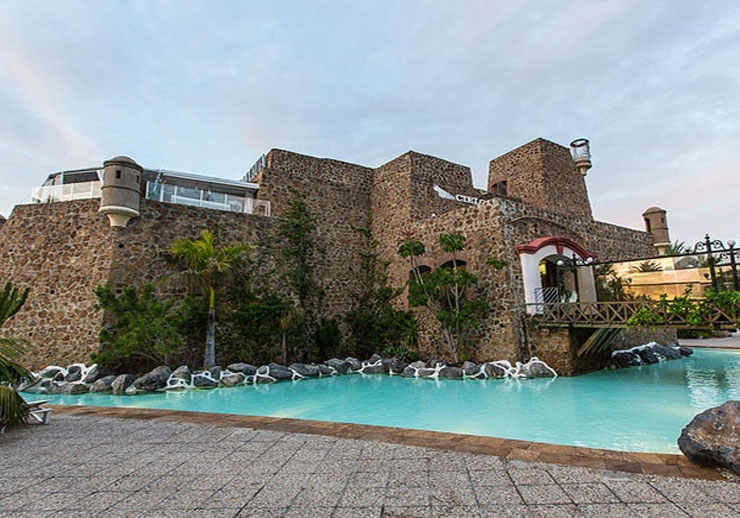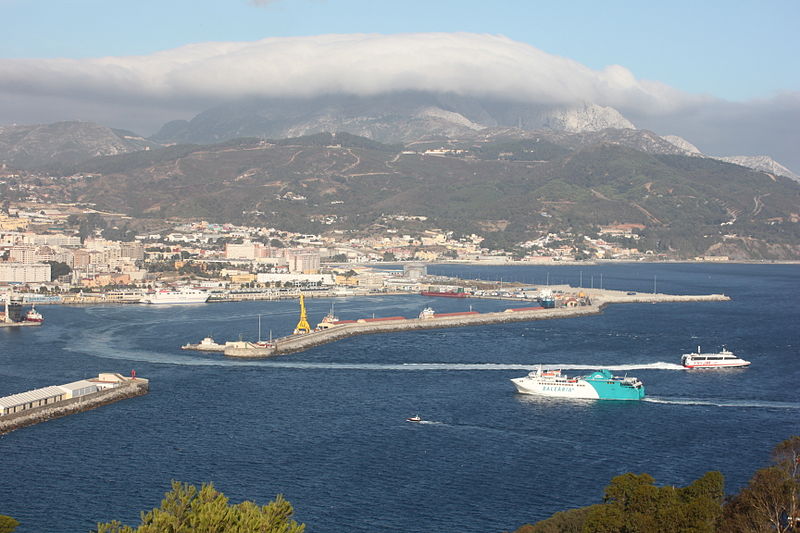Ceuta – Spain’s Rock
BILL HARTLEY visits a surviving fragment of the Spanish Empire

Gran Casino, Ceuta
The ferry from Algeçiras makes the world’s shortest intercontinental crossing as it travels to North Africa. Yet if the destination is Ceuta then the traveller remains technically at least in Spain. This strange exclave, one of two – the other, further down the coast, is Melilla – is considered part of Metropolitan Spain and returns a representative to the Cortez. The Moroccans disagree but the Spanish refuse to talk. Over in Gibraltar, Spain might be accused of hypocrisy but they believe international law is on their side. They argue that Ceuta was never a colony like Gibraltar.
This is a subject for debate perhaps among international law specialists. That apart though, what is the point of Ceuta? Strategically one can easily see some significance. From the air, the nine mile gap between Ceuta and Gibraltar is a tantalisingly narrow passage through which traffic in and out of the Mediterranean has to pass.
If Spain regained Gibraltar, so the argument goes, then it would control both sides of the straits. However since this is an international waterway little significance other than the symbolic can be attached to the idea.
Arriving at Ceuta, one is immediately struck by how underused the port is. Evidently roll-on-roll-off ferries are adequate to meet the needs of the 80,000 Spaniards who prefer to live in Africa. The port has no modern cargo handling facilities and sees little traffic other than the frequent ferries. Even at the height of the summer season they run three quarters empty, hinting at the subsidy supplied to the Balearia Shipping Line by Madrid. Were ferry sailings reduced to a more realistic level, then arguably some Ceutans might not find the 19 square kilometre territory such an attractive place to live, especially since there is no airport or indeed room to build one. Like its British counterpart across the water, Ceuta is a steep and rocky place beyond the confines of the town. Lack of an international airport suggests that the territory can never really succeed. This was the case with the former Portuguese colony of Maçao which withered whilst Hong Kong flourished.
Ceuta is a place for curiosity seekers and day trippers with tax-free shops and some good restaurants. The beach nearest the town is a rather pathetic strip accommodating a few local families on summer evenings. There is a semi-interesting fort, and the Spanish Foreign Legion has a museum in the town. The theory that Ceuta/Gibraltar were the Pillars of Hercules of the ancient world is given credence by climbing to the summit of Monte Hacho, which overlooks the port. From here on a clear day Gibraltar stands across the water like its twin. The Legion has a fort here and another lies on Monte Anyera, above the frontier with Morocco.

Port of Ceuta
Apart from the vague strategic argument for hanging on to the place Ceuta would seem to be more burden than benefit for Madrid. Mainland Spaniards for example pay a 2% surcharge on their bills so that Ceuta gets its electricity. The burden is also illustrated by the rather silly sign at the frontier with Morocco announcing that the visitor is now in Spain. Not so silly to the would-be illegal immigrants from North Africa who see this bit of barren hill and rock as a stepping stone to Europe. Border policing is expensive and thorough and wouldn’t have looked out of place in the old Soviet bloc. The Civil Guard carefully check papers and search vehicles to make sure undesirables don’t get through. There must have been some successes though, since security is equally strict down at the ferry terminal. Up in the hills the whole territory has had to be fenced off at great cost and is patrolled by members of the Spanish Foreign Legion. Presumably this gives them something meaningful to do. Otherwise their presence might only exist as a deterrent against the Moroccans chancing their luck and just marching in, as the Indians did with the Portuguese territory of Goa in 1961. All those Legionnaires contribute to the high level of public sector employment in the territory which is said to be 33%, as opposed to 12% in mainland Spain.
Arguably Madrid’s refusal to discuss the future of the territory with Morocco has brought about its continuing decline. Unlike Gibraltar with its financial services, dockyard, employment for 4,000 Spaniards and a GDP of nearly two billion pounds, Ceuta generates little real economic activity. Down the coast Tangier has long been regarded as the ‘Gateway to Africa’, more a romantic statement than a reality since its port is little better than Ceuta’s. However things have changed. Between Tangier and Ceuta lies Tanger Mer, where the expression is rather more realistic. Here a new port has been established with modern cargo handling facilities for the rapid turn round of container ships. This is supported by an excellent road network and an electrified rail link. With a second deep water port planned, Tanger Mer is set to become the largest in Africa and will be able to take advantage of a free trade agreement with the EU which came into force in 2012. It is easy to see how Tanger Mer will run its tentacles deep into the Maghreb. The knock-on effect can be seen right up to the Ceutan frontier. The Moroccan town of Techuan with its 25 kilometres of fine beach has a long strip of new seafront properties and hotels. At the frontier, trade with Ceuta largely amounts to whatever the locals can carry in the back of a taxi. Arab patience is severely tested by the lengthy wait whilst security checks are completed.
There is then the sense of a curious backwater, a bit of Spain clinging on in North Africa and doing nothing of value. With the creation of Tanger Mer, Spain has probably lost its opportunity to do something with the territory that would be of benefit to both countries. The question the Moroccans must be asking themselves is how long can Spain with its financial problems afford the cost of maintaining this outpost in Africa?
BILL HARTLEY is a freelance writer based in Yorkshire, and a frequent contributor to the Quarterly Review











Regarding Ceuta as a Spaniard, I think that there is some sentimentality around it, for it is not just a surviving fragment of empire but also a former Portuguese possession (check the coat of arms in the flag) which chose to remain Spanish when Portugal revolted in the 1640s… so we can’t leave them you know 🙂